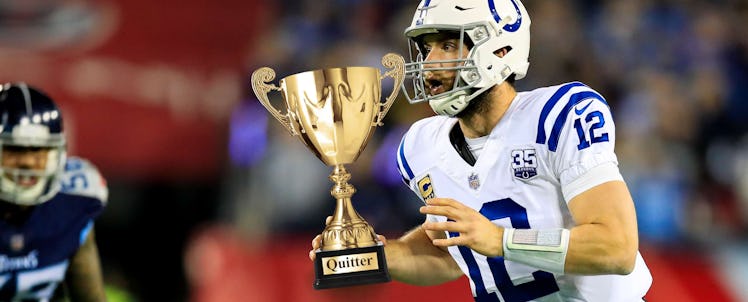Andrew Luck Is the Quitter Role Model Kids Need
When kids stop finding joy in the game, it’s time to let them walk away.

Long-time Indianapolis Colts quarterback Andrew Luck announced his retirement from football on Saturday, just two weeks before the start of the season. The star NFL QB said that he felt trapped by a constant cycle of injury and rehab and explained that the process of pain, recovery, and injury had “taken the joy out of this game.” In order to escape the cycle, he explained tearfully, it was time to leave. And while Luck likely wasn’t thinking about all the sports-dads watching his emotional press conference, he has none-the-less given us a lesson we should take to heart. When kids stop finding joy in the game, it’s time to let them walk away.
Sure, kids in youth sports aren’t dealing with the same kind of grown-up issues that trouble pro-football players. After all, Luck’s tough decision was based on constant pain that derailed his life. But that doesn’t mean that losing joy in a sport you once thought was fun isn’t just as difficult for a kid to deal with. And, for kids and pros both, that difficulty is compounded when you have someone pressuring to keep playing.
For Luck, that pressure came from fans and Colts staff and management. For kids, that pressure comes from parents who are fans and management rolled up in one. It’s hard to imagine what’s worse, really — the weight of a nation of fans or the weight of the person who says they love you most in all the world?
Despite what anyone says about the man, Luck is doing something profoundly important in focusing on his own health and well being. His life will probably improve significantly. His team will move on. The fans will move on. All in spite of how high the stakes are.
And here’s the thing sports dads should consider. How much smaller are the stakes when it comes to a kid bowing out of little-league or hanging up their football jersey? It makes very little difference in the grand scheme of things. But for some fathers, hearing their kid wants to quit the game can cause immeasurable angst. And for what reason? There are no million-dollar salaries at stake. There are no Super Bowl rings or merchandising contracts on the line. A kid who quits, even at the highest levels of youth sports, doesn’t leave that big of a hole.
Luck knows that his lack of joy doesn’t do anything for his team. And a kid who has lost joy in the game is no different when it comes to their team. Nobody wants to play with the kid who isn’t having fun. Nobody wants to play with the kid who only hustles because they’re worried about getting crap from their pops. And the worse part is that catching hell for lack of hustle just makes the whole thing that much joyless.
Of course, there needs to be a balance between resilience and reason. A kid will have bad, sometimes teary games; they may struggle through a practice or two. And after those bad games or practices, they should be encouraged to try again. Failing, making mistakes and learning from them is an important part of any endeavor. And parents are right to try and motivate their kid through tough spots. That said when the bad game becomes a bad season, and when a kid stops hitting the field with a smile on their face, then it’s time to let them make a choice.
Kids should be encouraged to recognize that youth sports are about the joy of performance and about having fun. When the joy and fun have dried up, then it’s time to move on — with a parent’s blessing.
And who knows, maybe if more parents get in the habit, there will be fewer pros who will suffer through joyless competition and fewer fans who will boo them when they decide it’s time to retire.